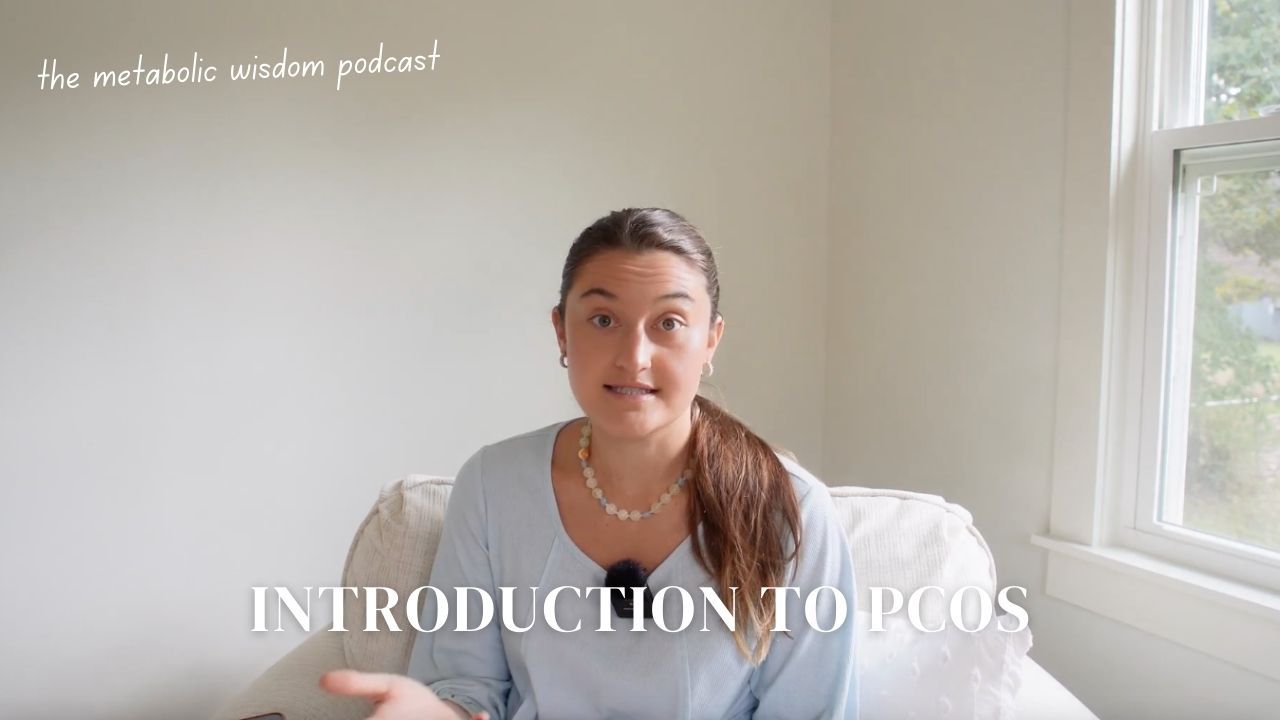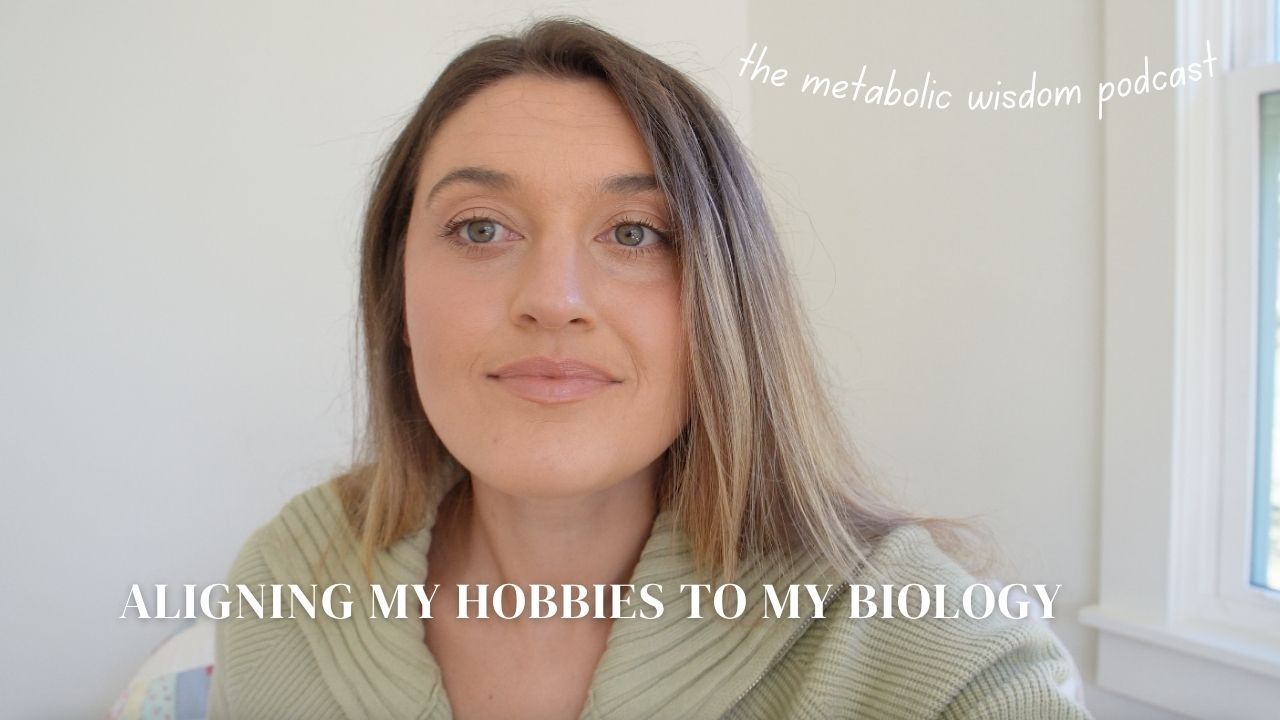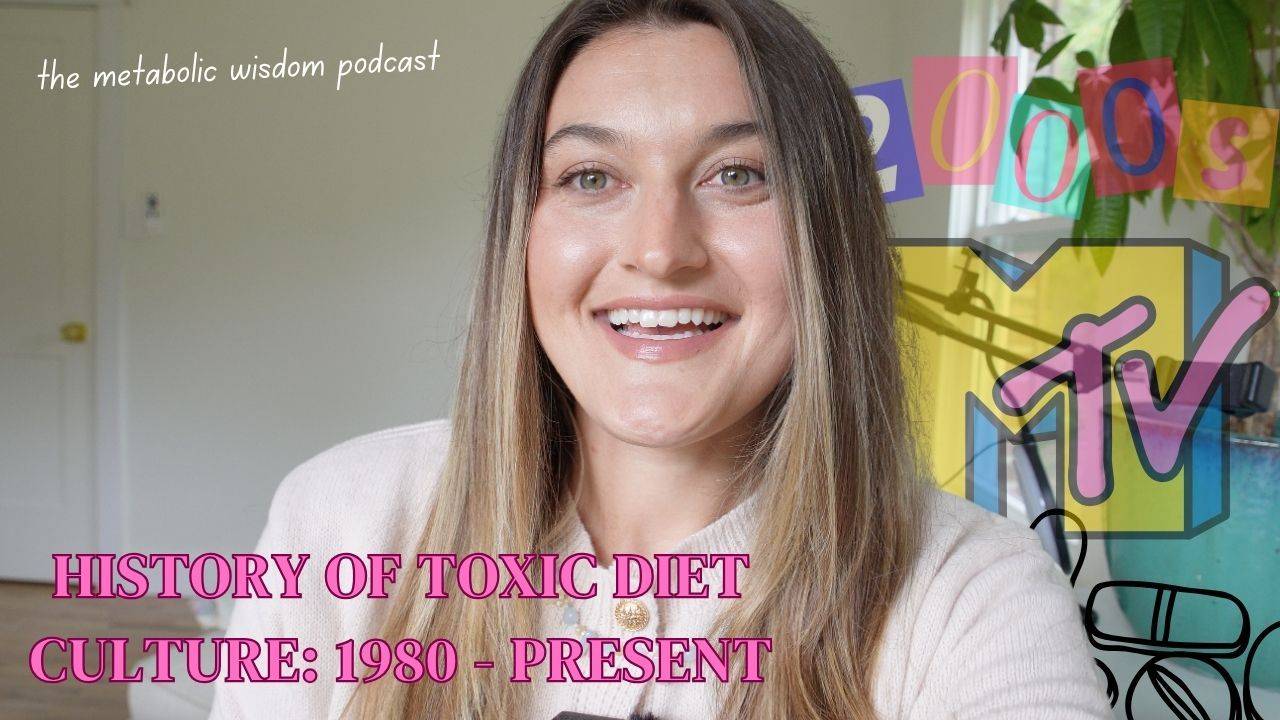An Introduction to PCOS

Sara Childers (00:06.872)
Good morning you guys and welcome back to the Metabolic Wisdom Podcast. My name is Sarah Childers and I am your host of course. Today we're going to be talking all about PCOS and
PCOS is so important right now because it is the leading cause of infertility in the United States. And when we think of PCOS, I think there's a lot of misconceptions that go around with what PCOS is, how you diagnose it, if you have it. Because I get a lot of clients in my...
dietitian practice every day who think they have PCOS or maybe they've been diagnosed and really it might be endometriosis or they might truly have PCOS and not even know it. So I wanted to film this podcast episode as a way to clear the air on what PCOS is and what some symptoms are and I might also do a part two if needed -- on how to recover from PCOS. So PCOS stands for polycystic ovarian syndrome. And really polycystic means multiple cysts on the ovaries. So multiple cysts on the ovary symptoms syndrome, excuse me.
Sara Childers (01:41.24)
PCOS is actually my specialty in my practice and it's been a wild ride with PCOS. One out of 10 women have PCOS now in the United States, which is a crazy number and I think there's a lot of reasons for this, which I will dive into, but.
I'm not gonna lie. I haven't done a podcast in a few weeks. There's a lot of reasons why. And one of the reasons is because I've been so busy working with all of my PCOS clients in my containers that I have where I work with clients one-on-one. I think that I put off doing this episode because there's so much information about PCOS on the internet that
may or may not be true, but as a professional who's studied PCOS, who has studied the GI map and minerals in the body and also hormones and how the female human body physiologically works, I've become super disenchanted with all of the social media jibber jabber about PCOS and all the quick fixes and all the supplements and all the protocols.
And I honestly think that in some ways PCOS is a result of toxic diet culture and PCOS is often the result of just our toxic over-hustling culture in general that is really dysregulated often by us women trying to do and be all the things all the time.
Sara Childers (03:55.224)
So that is what led me to actually want to film this episode because it's been on my list for a while and I know that I just need to go ahead and clear the air about PCOS. So let's get into it. The first thing I want to talk about is the way you diagnose PCOS. So every doctor is different. There's so many doctors that will diagnose you with PCOS and there's some doctors that won't touch it with a 10 foot pole. The most common...
criteria for diagnosis in PCOS is the Rotterdam criteria.
Sara Childers (04:43.79)
It was formed in 2003 and it's a set of three criteria and you only have to meet two of the three criteria in order to actually be diagnosed with PCOS.
Sara Childers (05:00.792)
The first criteria is not ovulating or having really irregular periods. So less than 10 periods a year or having a cycle that's longer than 35 days.
Sara Childers (05:23.5)
This is kind of the hallmark of PCOS and oftentimes people don't realize this, but when you have a period that is continuously being prolonged, that is not like an estrogen dominance issue. mean, it might be, it's usually a low progesterone issue, which I'm going to talk about how all these hormones kind of relate to PCOS in a minute, but that is the first criteria.
The next set of criteria is having high androgens. So androgens are things that eventually turn into other hormones such as testosterone.
Sara Childers (06:04.866)
This can kind of be hallmarked by like having chin hair or growing a small beard or losing hair on top of your head. Basically male pattern hair growth. So growing hair on the face and then also losing hair where you don't want it.
Sara Childers (06:36.386)
This is actually something that you can test for. So occasionally I will do a Dutch hormone test with a client and that shows all types of androgen levels. And there's also other tests that are highly related to the Dutch hormone test that I run as well if we don't want to do that exact one, but it still shows androgen levels. So we look at androgens, cortisol, DHEA, DHT.
testosterone, are all highly aldosterone, these are all highly related to androgen levels in the body. And if those are high and you also have the symptoms of them, that shows that you meet that criteria for PCOS.
Sara Childers (07:32.59)
And the third set of criteria is where you actually have cysts on your ovaries. So technically you don't even have to have cysts on your ovaries to be diagnosed with PCOS if you might meet the first two criteria of having a cycle that's longer than 35 days and also high androgens, which is super common. But a lot of doctors won't even diagnose you unless you meet this last criteria, which is having 12 or more cysts on your ovaries.
And a lot of times this has to be more than like 10 millimeters large if you only have like one in order to actually be problematic enough to diagnose you with PCOS. It's different across the board. I've had so many clients who've seen multiple doctors and all of them say something different about their PCOS, but that is how you know whether or not you actually have it.
Sara Childers (08:33.742)
And what's interesting is that many women who get off of the hormonal birth control pill have what we call post pill syndrome. So if you look into the dark web, you can find this, but this is where your hormones are a bit out of whack and your body is kind of like shocked by you no longer being on birth control.
and you might have a lot of these symptoms that seem PCOS like. I had these symptoms when I got hormonal birth control. I started to have hair loss and I would have hairs come up on my chin. And now I've gone through that same thing in the last few months of being under extreme stress. And so that's something that we'll talk about a little bit later is the signs that you're headed towards PCOS. But...
Sara Childers (09:42.562)
But if you've gotten off birth control in the last year or in the last few months, this may be something you're experiencing because of the fluctuation of you getting off hormonal birth control in your body trying to regulate again. And in this case, it might just take a little bit of time, but it would be good to really focus on doing the things you would do anyways to support your body if you have BCOS so that you can have those hormones go back to normal. Another...
group of people other than those who've recently gotten off birth control who might be more prone to deal with PCOS-like symptoms are those who have hypothyroidism. So hypothyroidism and PCOS often go hand in hand and there's many people who have one and end up with the other and vice versa.
So a lot of my clients that I get in my practice have either PCOS or I have clients with hypothyroidism. A lot of them have around like the same symptoms because your ovaries, your pituitary gland in your brain and your thyroid are so highly connected. Your pituitary gland has an access to direct communication with both your ovaries and your thyroid. So oftentimes when
One is dysregulated, it can influence the other, and there's a huge thyroid and estrogen axis just in general. A lot of times when we have too many estrogens in the body, it can slow things down in the liver and that can convert, or that can slow down the conversion of active thyroid hormone, inactive thyroid hormone to active thyroid hormone, T3 to T4, T4 to T3 type of thing.
which happens in the liver. But yeah, that's something to look out for, especially if you have
Sara Childers (11:36.238)
hypothyroidism.
Sara Childers (11:49.13)
And that is why PCOS and hypothyroidism, I would say kind of both together, are the leading causes of infertility in our country because the ovaries, the thyroid and your hormones all kind of work together in this cycle to support your fertility. Your thyroid has a huge, huge, huge influence on your...
fertility, but also of course your ovaries have a huge influence on your fertility as well and your hormones and how balanced those hormones are. A lot of times when we have high androgen levels, which are a hallmark of PCOS, it can be stemmed out of stress from the adrenals. So kind of backing up here back into like PCOS.
The interesting thing about hormones is that androgens can often, there's a lot of reasons why androgens can be out of whack, but usually it's because of either dysregulated cortisol or dysregulated insulin. So blood sugar issues or stress issues or circadian rhythm issues, so to speak. usually when we talk about PCOS,
everybody thinks, insulin resistant, insulin resistant, my blood sugar is bad, I'm insulin resistant, but that does not always happen in that way. A lot of times I get clients, even myself, who have great blood sugar levels, but you're highly stressed all the time and maybe your circadian rhythms aren't going well, maybe
You wake up at irregular times. You don't get that morning sunlight. You might not get a lot of sun during the day. You're around screens and fluorescent lights all the time. And then when you get off work, you're not getting that sunshine and you look at blue light into the night. And that's just really, really, really, really a huge disruptor in the hormones. So when we see that
Sara Childers (14:00.824)
blood sugar isn't the issue and that's always the first thing I look at with clients no matter what is making sure their blood sugar is balanced first and foremost before I do anything else. Because that goes back to nutrition, meal timing, protein intake and all the things. But once that's taken care of, then we look at stress and circadian rhythms. And this is something that I experienced for myself being very off balance because as somebody who owns a business,
Yes, I do own a wellness business. I have a, you know, private practice where I meet with clients one-on-one to work on their hormones. Even though it is health-based, it is still a business and I own multiple other businesses with my husband and I found that the stress, the life stress I went through and the blue light exposure I had from running our businesses is really what wrecked my hormones. So...
As a dietitian, my diet is, I mean, not perfect by any means. Like, I mean, I'm still a human. I still like to have, you know, certain things on the weekends or whatever, but for the most part, my diet's pretty good because I like to practice what I preach. But I found that stress is so much harder to control than your food. It's easy to control your food. It's easy to control when you work out.
And sometimes not working out can make that stress build up. And I found that with myself, like when I don't work out, that stress builds up even worse and makes my androgens even worse. But the main thing that I see is the circadian rhythm being off and the stress being off. And that all goes back to cortisol because cortisol is your stress hormone, but it's also circadian rhythm hormone. So cortisol is released based off of your light exposure.
And when you're constantly exposed to too much light, too much blue light, too much fluorescent light, your body's constantly releasing cortisol. And that's why so many people who change their light environment and they change their light exposure see crazy benefits with their thyroid and their cortisol and their androgens and just their health all around because you're no longer constantly releasing cortisol.
Sara Childers (16:25.358)
Because cortisol is primarily a circadian rhythm light exposure hormone. is not, it is a stress hormone, but it is primarily released based off of having that light exposure and your body thinking, it's light outside, we're exposed to a lot of light and we need to release cortisol to wake ourselves up. interesting stuff.
But it all goes back to your adrenals because your adrenals are what release that cortisol. Your adrenals release cortisol, adrenaline, DHEA and aldosterone and DHEA and aldosterone eventually become things like testosterone, estrogen and progesterone. So when your body is constantly stressed, constantly overexposed to light, your adrenal glands are going to release a lot of cortisol and adrenaline.
and they're not gonna spend as much attention and a much time making those DHEA and aldosterone hormones, or it might overproduce those hormones because it's being overactive and producing too much cortisol. Usually what happens is our adrenals overwork, they produce too many hormones. have
androgens that end up too high for a long time. And then our adrenals get fatigued and they get tired and they burn out and it no longer releases as much cortisol and as much DHEA and aldosterone. So it is like 90 to nothing. It's producing way too many hormones. It's causing all these symptoms.
hair loss, acne, hair growth. But then, if you don't get that taken care of, it gets to a point where your adrenal glands crash, they go from 90 to zero, and they're not producing enough cortisol, they're not producing enough DHEA, they're not producing enough aldosterone, and that makes your hormones crash. That makes you go into, sometimes we have low estrogen levels, which is really rare, but it happens.
Sara Childers (18:50.926)
but a lot of clients I see their, their metabolism crashes. They start to gain weight because their testosterone is low. Their testosterone has crashed. They become like kind of depressive and they're just low energy, low vibrancy, low, happiness, like just really on a low caliber because their body has crashed and they've just slowed down. So that's where we see.
the spike in the crash happened with PCOS.
Sara Childers (19:38.434)
And that's where you have low progesterone being made, low testosterone. And when estrogen is normal or high, but your testosterone, your progesterone is super low, that is where you have infertility. That's where you have miscarriages. That's where you have your body not feeling safe because it's been under stress for so long. It's been overworking for so long.
And that's where you see your body battery totally dwindle. And it happens so much. And it's honestly an epidemic of mass proportions in this country. And I say in this country, this is like the only country I've lived in. So the only country I'm going to really talk about is the United States. You know, it's probably like this in a lot of places, but we live in a culture where women work.
where women also take care of the children, where women are expected to do everything all the time. So like, let's say you're a real go-getter woman, because I think that hustle culture has actually been a huge proponent of infertility. I think that hustle culture and being someone who has to do everything all the time and has to control everything all the time.
That is what gets your progesterone low. That's what gets your testosterone crash. That's what crashes your metabolism because you're always under stress and you're always over producing and you end up drained. And I'm speaking from very personal experience. Like this is exactly what I've experienced in my own life and in my own health. Being someone who is a go-getter and who wants to work out, who wants to meal prep, who wants to run a business, who wants to buy another business, who wants to quit my job, who wants to...
You know, over the past three years, I've went through different phases where I was working three jobs at one point, and then I was also working out. And before that, I was training for triathlon, planning a wedding, and having a new job and doing a million different things at once. Now we've gotten to a point where we've quit our jobs, we own multiple businesses, we are renovating houses. We're doing way too much.
Sara Childers (21:56.162)
and I've seen the effects of it on my body and I've recognized in those seasons that when I'm go, go, go, my body is trending towards PCOS. Just from the symptoms I experienced, my hair falling out in globs, my acne coming back, even after I've been on Accutane, like just so many things happening. And so it's...
It's not lost on me why that happens to so many women, why so many women have this. It's actually, when you step back and look at everything, it's actually so obvious why everybody has PCOS-like symptoms and why everybody thinks they have PCOS because everybody is hustling hard. And I think that's why we've had this movement where a lot of women and
This is by no means pushing my personal beliefs or anything on anybody else, but I think that this is why we've seen this huge shift in the country of so many women like quitting their jobs and going home and being stay-at-home moms again. I think that so many women have subconsciously seen all that they need to see and they're like, it's not worth it to hustle, hustle, hustle. I'll sacrifice and not buy as much. I'll budget.
will live off one income or I'll find a way to make an income from home so I don't always have to be doing a million things at once because you can't do it all. You really just can't do it all. I think that if you're somebody who gets up early, maybe you go and do a workout, maybe then you pack your kids lunch or you get yourself ready for your day if you don't have kids yet.
you go to your work or you go to your business or whatever, you hustle hard and then you come home. Maybe you have a project to do, you have certain, certain.
Sara Childers (24:09.216)
responsibilities. My neighbor is literally just staring at me anyways. Anyways, have different responsibilities. You have to cook your husband dinner. You have to do laundry and don't even get me into like husbands not helping around the house. I think
Just to put my saltiness out there, I have a great husband and he does a lot. But you see a lot of men who don't do anything around their house, who bring nothing to the table other than the money to pay some bills. And I think that's a huge reason why women are so dysregulated as well, because women don't want to ask for help and men don't want to offer it. And you have this dynamic where a woman is
not only being the number one caretaker of her children, but she might even be the breadwinner and she might even be the one working and she might also be the one cooking and doing laundry. And then you just have a man who goes and who works his job and then comes home and is a couch potato and does nothing. And I think that that's also a reason why men have very low testosterone levels these days. I think men have a lot of stress.
in and of themselves with their own dynamic. But I feel as though women are stepping into such a masculine provider role in the house. having a blanket statement out there, not every house is like this, but generally speaking, women, I see so many women who they make the decisions in the house. They tell somebody when to do what. And when you have a woman stepping into that masculine role,
and into that provider role and doing all the things that not only emasculates your man, but that physiologically on a literal physiologically and biological level drains his testosterone. There are so many groups out there. If you get into the nitty gritty of the holistic crunchy world where you can find where couples go into this biologic dynamic again and
Sara Childers (26:34.762)
A man is being more of the protector and the woman is asking for help and he's being a provider. And within weeks or even days, you see this rise in a man's testosterone because he is doing what he's biologically meant to do, which is to provide and protect. And I think that when we just lean more towards our masculine state as women, that's where, and we try to control everything.
speaking from experience, again, that's when we see a dip with our hormones.
Sara Childers (27:17.816)
So I want to go through some symptoms that you might be trending towards PCOS, trending towards dysregulation in your own body so that you can have all the information you need in order to not only thrive, but to reevaluate yourself in your life and just take a step back. So some symptoms are you might be cold all the time, have constipation, oily skin, acne.
hair grows in places like the chin, chest, or even like upper lip, hair loss on top of the head, fatigue, anxiety, depression, PMS symptoms. PMS is kind of a problem on its own, but sometimes the PMS symptoms can be part of it. And overall, like sometimes it can be that you might feel more aggressive and angry.
if your testosterone is a little bit higher than it normally should be.
Sara Childers (28:28.654)
Basically, when we, and I don't mean to sound shallow when I say this, but the body does not lie and looks don't matter, but aesthetics do tend to tell a story, especially if you look into like skin health and Westin A. Price and facial structure, but also even what hormones do to the body. The body doesn't lie.
And if you are aesthetically trending towards a manlier look, and I don't even mean like muscular or body type. I just mean like if you feel less feminine, if your lips become thinner, if you start to get hair in places you don't want and start to experience hair loss and you're kind of losing that feminine beauty that you had before.
That is a sign that you're trending towards the masculine and you need to realign and reevaluate. That's why I made my Fully Feminine program. This is the only program and the only container I'm currently offering. This is a four month in depth, one on one weekly consultations where you work with me for four months. We do a little bit of functional testing and we also do a ton of education. And we look at your life and this is the most important part.
We look at your life and we look at context. And I think that is what so many doctors and so many nurse practitioners and so many health professionals have lost the plot on. They don't ask anybody any questions about themselves, their lives, anything like that. They don't have time and they don't care. Just being honest. They don't look into context. And when you don't look into context, you don't know the plot to even lose it.
But when we are doing this fully feminine program, we're realigning your life. We're realigning your light environment. We're not just looking at your diet. This is way more than just your nutrition program. This is light exposure. This is mineral testing. This is focusing on hormones, the firm foundations, realigning your life, educating you to know when to realign, how to easily do this, make it manageable.
Sara Childers (30:53.228)
and we take it bite by bite so that it's not overwhelming. It's simple. This is a simple, simple program, but we meet weekly because that is what it takes. That's what it takes to change. That's what it takes to make headway. Very few people are able to do this all on their own, especially if you're deeply unregulated, which is what I see a lot. We have a deep dysregulation with our health.
our minds, our bodies, and we're constantly on the search for new information. And we are always in search and research mode, getting these dopamine hits from all the information we read on blogs, dopamine hit, getting all the information we read on social media, dopamine hit. We listen to a podcast that's just chock full of information, dopamine hit. It is kind of crude to say, but a lot of...
health professionals call it information orgasm where you're just constantly getting a dopamine hit from information and you think you're doing something for your health but you're getting all the information but not actually taking any action with your health. And this is what this program does. We simplify everything so you're no longer getting influx of information, you're just doing the darn things that move the needle with your health.
So if you're interested, you can go to my website and book a consultation call and I would love to talk with you about the program, but let's get back into PCOS. So insulin resistance, yes, huge part of it, but not the whole part. Very, very few people have
really high insulin. It happens, it totally happens. I'd say it's 25 % of my PCOS population has genuinely high insulin levels based on high blood sugar. The other ones have either really high cortisol and stress, that's 50%. The other 25 % is we have an eating disorder. We have
Sara Childers (33:12.482)
fad diet, it's actually called food fattyism. I have a literal diagnosis code for insurance called food fattyism. And that is where someone has chronically fad dieted for years and years and years, and it is associated with disordered eating and you have likely ruined your metabolism because you either skip meals chronically or you chronically restrict and your metabolism is crashed.
And I can't tell you how many women I see this with. I would say 80 to 90 % of the women that I see that are over the age of 50 have this. 80 to 90%. I've only had very few women over the age of 50 who have not suffered from food fattyism and who don't have some type of eating disorder. Whether it's diagnosed or they know it or not, that's just how it is.
Sara Childers (34:43.274)
And I'll leave you with this. When we have symptoms, when we suffer
from changes in our body. That is not when we should abuse our body. That's not when we should be like, my gosh, my body hates me. This body's broken. No, it's actually not broken. It's doing exactly what it needs to do. There is more knowledge and more wisdom is in your body than there is in your greatest philosophy. That's one of my favorite quotes out there by Friedrich Nietzsche. But when we have symptoms, when our body works again,
against us. It's actually trying to tell us a story and send us signals to how we are not biologically aligned in our lives with what our body needs. So whether that is, hey, we don't need that many carbs. We need more protein. Your blood sugar is unstable. Let's make you feel like crap until you realize it. We're stressed. Our hair is falling out. You're turning more to the masculine. We need to
reel back and go into our feminine gentleness and our feminine softness and not be so hard and rigid. We have gut issues because our cortisol is out of whack because our nervous system is out of whack. You can't even digest food. That should be a sign that your nervous system is out of whack, your cortisol and your adrenaline and your stress.
have caused that most likely. So these are just a few examples, but we should never look at our body as if it's broken. It's always, always, always telling us a story. It's always telling us how we can improve and it's pieces that we need to actually look at and evaluate. And we need to step back and look at, okay, what does my food look like?
Sara Childers (36:47.532)
What does my belief system look like? What does my stress look like? What is my lifestyle doing for me? Like, if I were to live as an actual human being on this floating rock in space, planet Earth, is this what is really going to make me thrive? And it doesn't change overnight, because nothing does, and that's just dumb to even think that it would change overnight. But,
But these are things that you can consider when you are evaluating your own hormone journey and your own PCOS journey to see what may be the main issue and what you may be focusing on that is not beneficial or not moving the needle with your health. I would love to work with you in a program. If you're interested in working with me in my Fully Feminine Container, please get on my website. I'll have it linked below.
Let me know if you like this episode, comment anything that you would like for me to add in the next few episodes. I'm going to do another episode on metabolism and PCOS recovery, most likely. And then I have an amazing series planned where I am gonna go through different decades. It's gonna be 10 episodes. I'm gonna go through different decades of diet culture and how toxic diet culture has ruined our health as women.
It's gonna be really fun, because it's super history based, historic based on diet pills, laxatives, the Atkins diet, all the things and its effect on women's health. So if you would join me, I would love it. Hit subscribe, like this video if you're on YouTube and have a great week.






